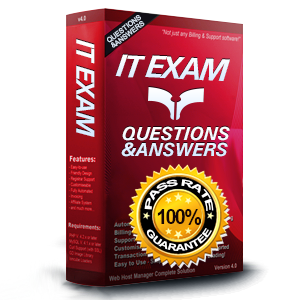
1Z0-432 Exam Questions & Answers
Exam Code: 1Z0-432
Exam Name: Oracle Real Application Clusters 12c Essentials
Updated: Apr 30, 2024
Q&As: 85
At Passcerty.com, we pride ourselves on the comprehensive nature of our 1Z0-432 exam dumps, designed meticulously to encompass all key topics and nuances you might encounter during the real examination. Regular updates are a cornerstone of our service, ensuring that our dedicated users always have their hands on the most recent and relevant Q&A dumps. Behind every meticulously curated question and answer lies the hard work of our seasoned team of experts, who bring years of experience and knowledge into crafting these premium materials. And while we are invested in offering top-notch content, we also believe in empowering our community. As a token of our commitment to your success, we're delighted to offer a substantial portion of our resources for free practice. We invite you to make the most of the following content, and wish you every success in your endeavors.

Download Free Oracle 1Z0-432 Demo
Experience Passcerty.com exam material in PDF version.
Simply submit your e-mail address below to get started with our PDF real exam demo of your Oracle 1Z0-432 exam.
![]() Instant download
Instant download
![]() Latest update demo according to real exam
Latest update demo according to real exam
* Our demo shows only a few questions from your selected exam for evaluating purposes
Free Oracle 1Z0-432 Dumps
Practice These Free Questions and Answers to Pass the Oracle Database Exam
Which three statements about Oracle RAC background processes are correct?
A. ACMS (Atomic Controlfile to Memory Service) is an agent that contributes to ensuring that a distributed SGA memory update is either globally committed on success or globally aborted if a failure occurs
B. GTXO-j (Global Transaction Process) controls the flow of messages to remote instances, manages global data block access, and transmits block images between the buffer caches or different instances
C. LMON (Global Enqueue Service Monitor) monitors global enqueues and resources across the cluster and performs global enqueue recovery operations
D. LMD (Global Enqueue Service Daemon) manages incoming remote resource requests within each instance
E. LMS (Global Cache Service Process) manages non-Cache Fusion resource requests such as library and row cache requests
F. LCKO (Instance Enqueue Process) manages background slave process creation and communication on remote instances
Which statement accurately describes the benefit of the policy-managed database feature with Oracle RAC 12cR1?
A. It protects against cascade failures due to network usage. It migrates workload isolation to specific pools. Less important workloads shut down immediately.
B. It protects against cascade failures due to load. It ensures that workload isolation is balanced between pools. Less important workloads start transactionally
C. It protects against cascade failures due to load. It ensures workload isolation between pools. Less important workloads shut down transactionally
D. It protects against cascade failures due to load. It ensures workload isolation between pools. Less important workloads shut down and start uniformly.
E. It protects against cascade failures due to load. It ensures workloads are not isolated between pools. Less important workloads shut down transactionally.
You want to start the ASM1 instance on node host01. Which three options can you use?
A. $ srvct1 start asm -n host01
B. $ srvct1 status asm -n host01
C. $ asmca Disk Groups - > Mount All
D. $ . oraenv
ORACLE_SID = (+ASM1) ? +ASM1The Oracle base for ORACLE_HOME=/u01/app/12.1.0/grid is /u01/app/grid
S asmcmd
ASMCMD (+) > shutdown -abort
E. $ . oraenv
ORACLE_SID = (+ASM1) ? +ASM1The Oracle base for ORACLE_HOME=/u01/app/12.1.0/grid is /u01/app/grid
S asmcmd
ASMCMD> startup
F. $ export ORACLE_SID =+ASM1$ export ORACLE_HOME=/u01/app/12.1.0/grid
$ $ORACLE_HOME/bin/squiplus/AS SYSASM
SQL> startup
You are building a new 12c cluster to accommodate the upcoming projects. You are currently working with the network admin team to define the requirements needed. Currently, the network team would like to get cleared on the protocols being used by the various network interface needed. Which three statements about Clusterware communication are correct?
A. For the public network, each network adapter must support TCP/IP. This requirement holds true for both Microsoft Windows and Linux/Unix environments
B. For the private network, the interface must support the user datagram protocol (UDP) using high speed network adapters and switches that support TCP/IP. This holds true in the Linux/Unix environment.
C. For the public network, each network adapter needs to support only UDP, which provides low latency. This requirement holds true for both Microsoft Windows and Linux/Unix environments
D. For the private network, the network adapters must use high-speed network adapters and switches that support TCP/IP. This requirement holds true in the Microsoft Windows environment
E. There is no mandatory requirement for the protocol being supported for both private and public interfaces. Oracle RAC and Clusterware aulomatically detect and support any current standard industry protocol
In a clustered Oracle ASM environment, a diskgroup is mounted in restricted mode. Which statement is correct?
A. You can mount the disk group on all the nodes.
B. You can issue any command, as long as you are using the force option.
C. You can open the database located on this disk group only in standalone mode.
D. You can open the database on this disk group only in restricted mode.
E. You know that nobody is using the disk group, so you can perform a fast rebalancing on the disk group.
Viewing Page 3 of 3 pages. Download PDF or Software version with 85 questions

